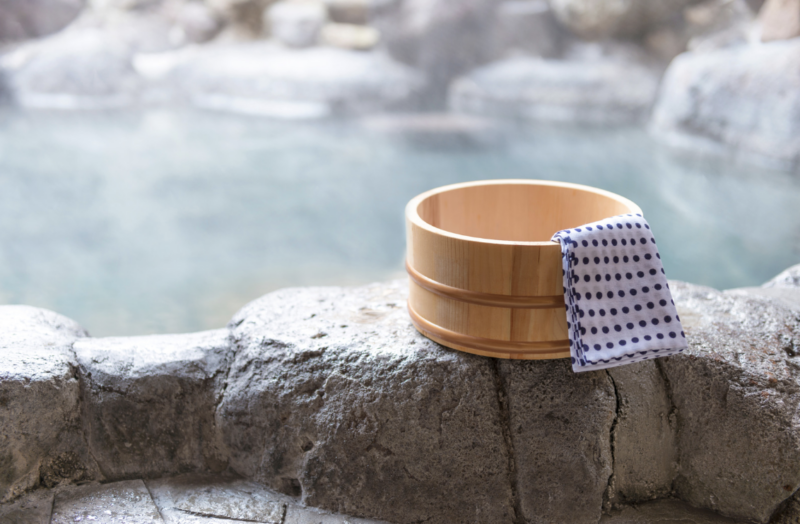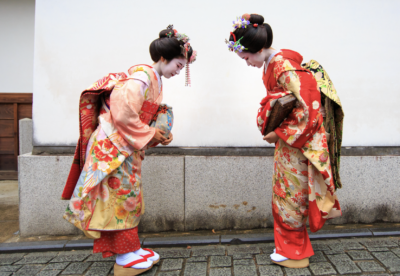Japan Etiquette for Tourists – The Do’s and Don’ts to Keep in Mind
Japan has its own special ways and traditions that might seem a bit confusing when you first visit. No need to worry, though! Everyone understands that you’re learning, and it’s perfectly fine to make mistakes along the way.
In this guide, we’ll share some easy tips on what to do and what not to do in Japan. This will help you feel more confident and have lots of fun on your trip. Let’s dive in and find out how to enjoy Japan like the locals do!
Top 10 Dining Etiquette Tips in Japan

- Say “Itadakimasu” Before Eating
Before you start eating, it’s customary to say “Itadakimasu,” which means “I gratefully receive.” This phrase shows appreciation for the food and those who prepared it, setting a respectful tone at the meal. It’s akin to saying grace and is a fundamental part of dining etiquette in Japan. - Proper Use of Chopsticks
Chopsticks should be used properly, avoiding actions like pointing with them or sticking them vertically into rice, as these can be seen as disrespectful. When not in use, place them on a chopstick rest or horizontally across your bowl. Never pass food directly from your chopsticks to another’s, as this mimics a funeral rite. - Slurping Noodles
Slurping noodles is not only acceptable but encouraged in Japan, particularly with hot dishes like ramen or soba. This practice enhances the flavor and helps cool down the noodles as you eat them. Slurping is considered a compliment to the chef, indicating enjoyment of the meal. - Don’t Walk While Eating
Eating while walking is generally frowned upon, as it can be seen as sloppy and impolite. This practice is especially discouraged in busy or sacred areas. If you must eat on the go, try to find a quiet spot to stop and enjoy your food respectfully. - Taste the Local Cuisine
Embrace the local cuisine by trying different dishes, which can deepen your cultural experience. From sushi bars to street food like takoyaki, each region has specialties worth trying. Engaging with local food also shows respect and interest in the culinary traditions of Japan. - Hang on to Your Trash
With public trash cans rare in many places, it’s important to carry a small bag to store your trash until you find a place to dispose of it properly. This practice helps maintain the cleanliness that Japanese streets are known for. Being mindful of your waste also reflects well on tourists as considerate guests. - Avoid Blowing Your Nose in Public
Blowing your nose in public, especially at the dining table, is considered rude in Japan. If you need to blow your nose, it’s best to excuse yourself and find a restroom or private space to do so. This discretion is appreciated and shows sensitivity to those around you. - Learn Some Useful Japanese Phrases for Dining
Knowing phrases such as “Oishii” (delicious) or “Gochisousama deshita” (thank you for the meal) can greatly enhance your dining experience. These expressions of gratitude and enjoyment are well-received and can lead to warmer interactions with staff and locals. They also demonstrate an effort to engage with the culture. - No Tipping Required
In Japan, there is no tipping culture; excellent service is expected and provided without the expectation of extra rewards. Offering a tip can sometimes confuse or embarrass the recipient. Respect this aspect of the culture by adhering to local practices. - Respecting Queue Norms at Eateries
Patience and order are highly valued in Japan, especially when waiting in line at popular restaurants or street food stalls. Jumping the queue is considered very rude and can upset both locals and other tourists alike. Observing queue norms demonstrates respect for local customs and ensures a harmonious experience for everyone involved.
Top 10 Public Behavior Tips

- Be Quiet on Public Transport
Silence is golden on Japanese public transport, where many people use their journey time as a chance to rest or work. Loud conversations or phone calls are considered disruptive. Using earphones for any personal audio is also expected, as it maintains the quiet environment. - Know How to Use the Escalator
In cities like Tokyo, the unspoken rule is to stand on the left of escalators and walk on the right; however, this is reversed in Osaka. Observing and following these local norms helps avoid blocking the way for hurried commuters and maintains smooth traffic flow. - Don’t Bother the Geishas and Maiko
Geishas and Maiko (apprentice Geishas) are professionals practicing an ancient art, not tourist attractions. It’s important to respect their space and privacy. If you wish for a photo, keep a respectful distance or ask politely without expectation. - Take Your Shoes Off Indoors
In Japan, removing shoes before entering someone’s home, certain traditional accommodations, and even some restaurants is a sign of respect. It helps keep indoor areas clean. Always look for shoe racks at the entrance or follow the host’s lead - Respect Quiet Zones
In Japan, certain areas are designated as quiet zones, especially in public transport like the Shinkansen (bullet trains) and specific train carriages. Observing silence in these zones is crucial as many people use this time to work or rest. Avoid loud conversations and ensure your phone is on silent mode. Respecting these quiet zones shows consideration for the comfort and needs of others around you. - Be On Time
Punctuality is a serious matter in Japan; being late is often seen as a sign of disrespect. Whether it’s a train departure, a business meeting, or a casual meetup, try to be a few minutes early to show respect for other people’s time. - Don’t Cut in Line
Respecting the queue is fundamental in Japanese culture, whether at the subway station, in a store, or waiting for a taxi. Cutting in line can lead to public embarrassment and shows a lack of respect for the local customs. - Observe Local Rules and Signs
Always be attentive to signs and rules, especially in places of cultural and historical importance. These guidelines are often in place to protect the sanctity and beauty of locations that are valued by the local community. - Avoid Phone Calls on Public Transit
Keeping phone calls to a minimum and speaking quietly if necessary helps maintain the tranquil atmosphere typically found on Japanese public transport. Texting or using apps silently is a more acceptable way to communicate while traveling. - Learn Basic Local Gestures and Signs
Small gestures, such as bowing or nodding, can convey respect and gratitude without the need for words. Observing and mimicking these gestures as appropriate can help bridge the cultural gap and foster positive interactions.
Other Japan Etiquette Tips

- Gift Giving Manners
If you’re invited to a Japanese home, it’s customary to bring a small gift, such as a box of sweets or tea. Gifts are often wrapped meticulously, and it’s polite to accept gifts with both hands. - Handling Business Cards
When receiving a business card, take it with both hands and take a moment to look at it before putting it away respectfully. This shows appreciation for the person giving you their card. - Using Public Baths (Onsen)
Before entering an onsen (hot spring), make sure to wash and rinse your body thoroughly at the washing area. It’s important to keep the bath water clean for everyone. - Handling Money with Care
When paying for goods or services, use both hands to give and receive money. This is seen as a sign of respect and care. It’s also polite to place the money in the small tray provided at cash registers, rather than handing it directly to the cashier. - Photography Etiquette
Always ask for permission before taking photos of people or private property. In some culturally sensitive areas, such as temples or certain museums, photography might be restricted. Look for signs or ask if it’s unclear whether taking photos is allowed.
Takeaway
This guide introduced the main etiquettes to keep in mind as you travel in Japan.
Remember that being polite and following the rules shows respect and makes your trip even better, whether you’re wandering through busy Tokyo streets, relaxing in a beautiful Kyoto garden, or taking a warm bath in an onsen.
So, keep learning about Japanese ways, be curious, and have lots of fun on your adventure. Japan has so much to show you!
Looking for a travel agency to help with your planning?
Contact Firefly Japan today and let’s start crafting your Japan luxury tour for the trip of a lifetime



